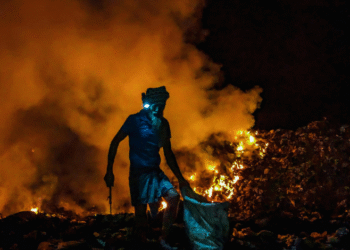Wondering is dumpster diving illegal in Ohio. Discover the laws, risks, and tips to stay safe while scavenging for hidden treasures.
Dumpster diving is not specifically illegal under Ohio state law, but it is not a free pass moreover. Taking particulars out of a dumpster is not automatically a crime, but the circumstances around it can make it one.However, ignore posted warnings, or break megacity rules, If you enter private property. In short, dumpster diving in Ohio lives in an Argentine area where environment matters further than the act itself.
Why I Became Interested in This
I first became curious about dumpster diving when a college friend showed up to study sessions with unopened snacks, leftover bakery bread, and even working electronics that he claimed to have “rescued” from dumpsters. At first, I thought he was just reckless. I assumed he was breaking some clear law. One night he convinced me to join him. We found crates of day-old bagels behind a bakery, and it hit me just how much usable food was being tossed. I was amazed but also uneasy. My heart raced as I kept asking myself, what if we got caught. That curiosity pushed me to learn more about the legal reality of dumpster diving in Ohio, and what I discovered might surprise you.
Ohio State Law on Dumpster Diving
The good news is that Ohio has no state wide law that directly bans dumpster diving. Once something is discarded, it is usually considered abandoned property. In theory, if no one owns it anymore, anyone can take it. But here comes the catch: the trash itself may be abandoned, but the land it sits on is not. Private property rights still apply. If you step onto private property without permission, even just to grab food from a dumpster, you can be charged with trespassing.
This is where most people get confused. They hear that abandoned property is free to take, but they forget that access matters. Dumpster diving is not really about what you grab but about where you are standing when you grab it.
Local City Ordinances in Ohio
Beyond state law, each Ohio city has its own ordinances that complicate things further.
In Columbus, many neighbourhoods enforce strict loitering and trespassing rules, especially around businesses after dark. Diving in these areas can lead to police encounters.
Cleveland has rules against scavenging, particularly regarding scrap metal and recyclables, because those items have resale value. Taking them can be treated as theft rather than just collecting trash.
Cincinnati tends to focus on trespassing laws. Being behind a business after hours is more likely to trigger a charge than the act of dumpster diving itself.
In smaller towns, ordinances may be less strict, but local communities may be quicker to call police about suspicious behaviour. It is a lot like driving: the state wide rules set the framework, but each town enforces things differently, and local context matters.
The Common Gray Areas
Dumpster diving is full of situations where the legality is not clear-cut. Here are the ones people run into most often.
Still, similar as on a sidewalk or in an alley, you’re less likely to face trouble, If a dumpster is on public property. But if the dumpster is behind a gate, coming to a private business, or easily on private land, entering the area could be trespassing.
Business dumpsters are attractive because they often contain large amounts of food or goods. But businesses are also quick to report people on their property, especially at night. Residential trash is different. While it is technically abandoned, many cities have safety rules against picking through it, and neighbours may see you as suspicious.
The time of day also matters. At night, diving can look further suspicious to police or business possessors, indeed if you are not breaking any rules. During the day, people may gawk, but you’re less likely to be indicted of loitering.
How to Dumpster Dive Legally in Ohio
If you want to reduce your risk, there are some practical steps to follow.
First, look for posted signs. If you see “No Trespassing” or “Private Property” warnings, do not dive there. Second, whenever possible, ask for permission. Some small businesses are surprisingly open to it. I once had a bakery owner tell me directly that I could come by before trash pickup to take bread they were throwing away. Third, stick to public access areas like dumpsters in alleys or on sidewalks where no gates or fences are involved. Finally, be respectful. Do not scatter trash or leave a mess. The more courteous and discreet you are, the less likely anyone will bother you.
Safety Tips You Should Keep in Mind
Indeed if you avoid legal trouble, dumpster diving has its pitfalls. Wearing gloves is a must ago dumpsters frequently contain broken glass, essence, or chemicals. Be careful with food. A sealed package might look safe, but bacteria and temperature changes can make it dangerous. Trust your instincts and avoid anything questionable. Bring a flashlight if you’re diving at night, but do not look like you’re breaking in. A small light is enough. Eventually, avoid climbing all the way in. Numerous injuries occur when people fall into dumpsters or get wedged. Stick to what’s fluently accessible near the top.
Alternatives to Dumpster Diving in Ohio
If your main goal is saving money or reducing waste, you have other options that carry no legal risk.
Food banks across Ohio regularly distribute perfectly good food that stores cannot sell. Freecycling groups and “Buy Nothing” networks online let people give away furniture, clothes, and other items at no cost. In larger cities such as Columbus and Cleveland, community fridges are becoming common. These are public refrigerators stocked with donated food for anyone who needs it.
These alternatives not only remove the legal uncertainty but also give you access to safe resources without the stress of trespassing concerns.
A Real Case from Dayton
To see how the law plays out in practice, consider a case from Dayton. A man was caught behind a store late at night looking for food. He was not fined for dumpster diving. Rather, he was fined for trespassing. The court watched lower about what he was taking and further about the fact that he was on private property without authorization. This case captures the reality in Ohio impeccably. Dumpster diving itself is not a crime. Where you do it and how you do it’s what matters.
Frequently Asked Questions
Can you get arrested for dumpster diving in Ohio?
Yes, but usually not for the act itself. Arrests are generally tied to trespassing, loitering, or theft depending on the situation.
Is dumpster diving behind stores like Walmart or Aldi legal?
Not really. Those dumpsters are on private property, and going onto that property without permission is trespassing.
What is the best time to dumpster dive in Ohio?
From a legal standpoint, daytime is safer. From a practical standpoint, right after stores close or before garbage trucks arrive is when dumpsters are fullest.
Is dumpster diving considered stealing?
If an item is truly abandoned and accessible from public property, no. But if it is fenced off, locked, or posted as private, taking it can be treated as theft.
Can the police stop you for dumpster diving?
Yes, they can. They may issue a warning, write a ticket, or in some cases arrest you, depending on the situation.
Final Thoughts
So is dumpster diving illegal in Ohio, Not directly. The act of taking a commodity from a dumpster is not against state law, but the circumstances frequently make it parlous. The real issue is not the trash itself but the property it sits on. For anyone considering it, the safest approach is to check original bills, stick to public areas, and consider druthers like food banks or community barters.
My particular takeaway after learning all of this is that dumpster diving opened my eyes to the waste we produce as a society. At the same time, I realized how snappily an inoffensive action could spiral into a legal problem. Free chuck is nowadays worth a felonious record. However, do it precisely and responsibly, If you do decide to try it. And if you ever find yourself facing charges because of dumpster diving, the smartest step is to talk to an original attorney who understands Ohio’s trespassing and theft laws.
Additional Resources
Local reporting: Taking discarded items from dumpsters in Ohio: Recent local coverage summarizing how Ohio municipalities approach dumpster-diving (good for practical, on-the-ground examples).

















